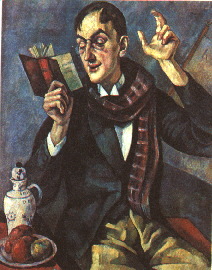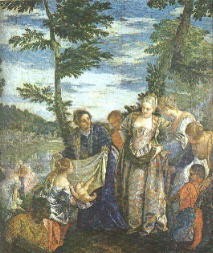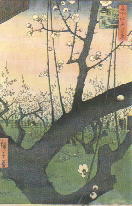

Ars poetica or research for "more receptive form"
Poetry - its role and essence - is continually resumed in all Milosz’s work. Let us have a closer look at different aspects of this:
- A) Poetry in service of a man:
PREFACE (Treatise on Poetry)
First, plain speech in the mother tongue.
Hearing it, you should be able to see
Apple trees, a river, the bend of a road,
As if in a flash of summer lightning.
And it should contain more than images.
It has been lured by singsong,
A daydream, melody. Defenseless,
It was bypassed by the sharp, dry world.
You often ask yourself why you feel shame
Whenever you look through a book of poetry.
As if the author, for reasons unclear to you,
Addressed the worse side of your nature,
Pushing aside thought, cheating thought.
Seasoned with jokes, clowning, satire,
Poetry still knows how to please.
Then its excellence is much admired.
But the grave combats where life is at stake
Are fought in prose. It was not always so.
And our regret has remained unconfessed.
Novels and essays serve but will not last.
One clear stanza can take more weight
Than a whole wagon of elaborate prose.
In this piece of work, the concept of moral poetry was formulated, that is to say, poetry which creates and at the same time preserves values. Saving of nations and people is possible only through identifying the Simplest values but ones that are essential for the spiritual nature of man as well.
This search for values starts with the protest: rejection of violence, insensibility, evil (-> Look at „Campo dei Fiori” ) and „You Who wronged” from volume „Daylight”:YOU WHO WRONGED (Daylight) You who wronged a simple man Bursting into laughter at the crime, And kept a pack of fools around you To mix good and evil, to blur the line, Though everyone bowed down before you, Saying virtue and wisdom lit your way, Strrking gold medals in your honor, Glad to have survived another day, Do not feel safe. The poet remembers. You can kill one, but another is born. The words are written down, the deed, the date. And you'd have done better with a winter dawn, A rope, and a branch bowed beneath your weight.
Washington, D.C., 1950
- B) Poetry helps to define position in life
„The purpose of poetry is to remind us now difficult it is to remain just one
person, for our house is open, there are no keys in the doors, and invisible
guests come in and out at will”
ARS POETICA? (City without Name)
I have always aspired to a more spacious form
that would be free from the claims of poetry or prose
and would let us understand each other without exposing
the author or reader to sublime agonies.
In the very essence of poetry there is something indecent:
a thing is brought forth which we didn't know we had in us,
so we blink our eyes, as if a tiger had sprung out
and stood in the light, lashing his tail.
That's why poetry is rightly said to be dictated by a daimonion,
though it's an exaggeration to maintain that he must be an angel.
It's hard to guess where that pride of poets comes from,
when so often they're put to shame by the disclosure of their frailty.
What reasonable man would like to be a city of demons,
who behave as if they were at home, speak in many tongues,
and who, not satisfied with stealing his lips or hand,
work at changing his destiny for their convenience?
It's true that what is morbid is highly valued today,
and so you may think that I am only joking
or that I've devised just one more means
of praising Art with the help of irony.
There was a time when only wise books were read,
helping us to bear our pain and misery.
This, after all, is not quite the same
as leafing through a thousand works fresh from psychiatric clinics.
And yet the world is different from what it seems to be
and we are other than how we see ourselves in our ravings.
People therefore preserve silent integrity,
thus earning the respect of their relatives and neighbors.
The purpose of poetry is to remind us
how difficult it is to remain just one person,
for our house is open, there are no keys in the doors,
and invisible guests come in and out at will.
What I'm saying here is not, I agree, poetry,
as poems should be written rarely and reluctantly,
under unbearable duress and only with the hope
that good spirits, not evil ones, choose us for their instrument.
Berkeley, 1968
translated by Czeslaw Milosz
and Lillian Vallee
- C) Elaborating on the art of poetry: „Ars
poetica,” the title of the poem refers to ancient times, because such were
termed the treatises on poetry, explainig rules and norms it was supposed to
put into practice. The question mark included in the title suggests a kind of
hesitation: is it possible to establish any rules for the art of poetry?
Here, Milosz looks for a „more receptive form”, tries to cross the border
between poetry and so called „non-poetry.” He also creates a new hierarchy of
poetical values: understanding between the author and the reader, because it
guarantees the possibility of transmission of important messages; the ones
„helping us to bear our pain and misery.” One other thought also is present here:
that poetry can be in service of both, good and crazy artists. One may assume that according to Milosz it is abnormal to resign completely
to different order stimuli and imagination, with which the gradual
disappearance of consciousness is connected, and which results in the loss of
contact with reality and driveling take place. Such an art does not bring
relief to pain. In the poem „No More” the question „Who is it - a poet?” is
brought under discussion.
NO MORE(King Popiel and Other Poems)

I should relate sometime how I changed
My views on poetry, and how it came to be
That I consider myself today one of the many
Merchants and artisans of Old Japan,
Who arranged verses about cherry blossoms,
Chrysanthemums and the full moon.
If only I could describe the courtesans of Venice
As in a loggia they teased a peacock with a twig,
And out of brocade, the pearls of their belt)
Set free heavy breasts and the reddish weal Where the buttoned dress
marked the belly)
Where the buttoned dress
marked the belly)
As vividly as seen by the skipper of galleons
Who landed that morning with a cargo of gold;
And if I could find for their miserable bones
In a graveyard whose gates are licked by greasy water
A word more enduring than their last-used comb
That in the rot under tombstones, alone, awaits the light,
Then I wouldn't doubt. Out of reluctant matter
What can be gathered? Nothing, beauty at best.
And so, cherry blossoms must suffice for us
And chrysanthemums and the full moon.
Montgeron, 1957
translated by Anthony Milosz„No more” Here the reflection appears: a poet, from being an artist, becomes a craftsman. A question is asked: „ how did it happen ?”, „what is the vocation of a poet ?” It seems that for the lyrical subject the value of poetry is situated somewhere behind the aesthetical categories. And the poet has to constantly fight with the stubborn words.
SO LITTLE (From the Rising of the Sun)
I said so little.
Days were short.
Short days.
Short nights.
Short years.
I said so little.
I couldn't keep up.
My heart grew weary
From joy,
Despair,
Ardor,
Hope.
The jaws of Leviathan
Were closing upon me.
Naked, I lay on the shores
Of desert islands.
The white whale of the world
Hauled me down to its pit.
And now I don't know
What in all that was real.
Berkeley, 1969
translated by Czeslaw Milost
and Lillian VallecIn the poem one can note the analysis of chances a human being has while realizing his or her wishes and ambitions. The datum here is the biography of the artist
| Info-Poland a clearinghouse of information about Poland, Polish Universities, Polish Studies, etc. |